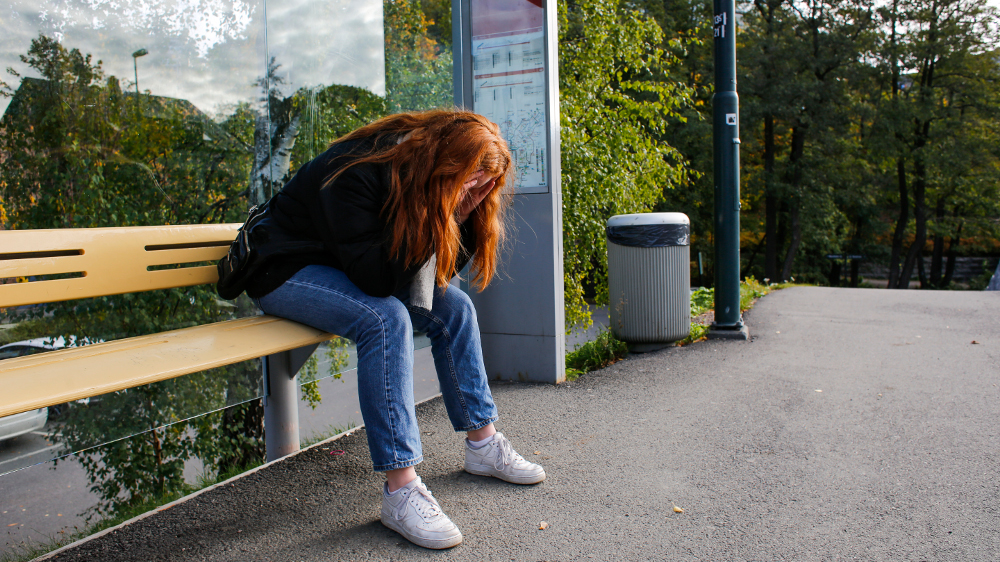New research at the Department of Psychology has revealed a dramatic increase in loneliness and symptoms of anxiety and depression as a result of the pandemic restrictions. Women and young people are the hardest hit.

New studies have revealed that women and young adults in particular are among those who are experiencing a marked increase in mental problems as a result of social distancing measures. Foto: NTB/Scanpix
During the pandemic, symptoms of anxiety and depression have increased two to threefold in Norway. This increase is the same for loneliness. Omid Ebrahimi is a psychologist and double PhD candidate at the Department of Psychology (PSI). Accompanied by Asle Hoffart and Sverre Urnes Johnson, he is leading a research project designed to investigate the connection between distancing measures, isolation and quarantine as related to the coronavirus and mental health.
Like studies from other countries, the researchers have uncovered considerable increases in mental health problems among Norwegians.
"We have discovered that social distancing measures are closely associated with loneliness, anxiety and depressive symptoms. Over the past year, the intensity of these symptoms has been consistent with the scope and severity of these measures," says Mr. Ebrahimi.
A clear signal
This project at the PSI has become one of the most comprehensive studies conducted on the impact of the pandemic on mental health in a global perspective. Over the course of one year of conducting repeated surveys, Omid Ebrahimi and the other researchers have been following groups of five to ten thousand Norwegians, from the start of the pandemic to the present day.
He says that the feeling of loneliness that many people are struggling with indicates that individuals are not very good at being too far away from their groups.
"In an evolutionary historical context, we have managed to survive better when we are together. As the distance between us and our groups increases, feelings of loneliness arise as a kind of pain that motivates us to return to them," says Mr. Ebrahimi.
"In the current pandemic situation, some restrictions are making it much harder than before to do something about this distress," he says.
Many suffering from mental problems
Their studies have revealed that women and young adults in particular are among those who are experiencing a marked increase in mental problems as a result of social distancing measures.

Omid Ebrahimi has shown that young adults in particular have been severely hit by the pandemic restrictions. Those between the ages of 18 and 30, and especially those between the ages of 18 and 25, have had their everyday structure turned upside down to a greater extent than older age groups.
"Many of them are first-time students who will soon have completed one year of studies without having physically met each other," he says.
It is also these young adults who say that it is particularly hard for them to comply with the authorities' measures.
"Unfortunately, in some places this group has been portrayed as being the group which is least concerned about the measures. However, this does not tally with our figures. Young adults are actually the ones who are experiencing the most problems during the pandemic, and their symptoms are also largely related to social distancing measures," says Mr. Ebrahimi.
High degree of compliance
During a pandemic the authorities can employ two types of behavioural strategies as they wait for a vaccine: hygiene-based measures - such as washing one's hands and wearing face masks - and social distancing measures - such as the 1-metre rule and a ban on visiting. Both strategies require a high degree of compliance among the population.
Thomas Hylland Eriksen, a professor at the Department of Social Anthropology, has been conducting research on crises in the Overheating project. He has been following the development of the pandemic with great interest and believes that compliance is largely a matter of trust.
"When Norwegians are asked to do something by the authorities, we are less suspicious than people in many other countries. In Norway we benefit from having an egalitarian and slightly hierarchical culture. This is apparent in the way the authorities communicate with us," he says.
"Even though many people were probably slightly annoyed with Erna Solberg for breaking the rules before Easter, I think in retrospect that many people think that it was quite OK, i.e. she's no better than the rest of us. Mrs Solberg comes across as being a caring family member when she speaks to us, and she has played that role very well throughout the pandemic," says Mr. Hylland Eriksen.
The relationship that Norwegians have with nature is another comparative advantage, according to the anthropologist, who points out that the great outdoors are almost as available to everyone as they were before the pandemic.
"If you live in Paris or Florence, you go to a gallery, a football match or a café. You're out in the streets. When you can't do what you used to do, you don't have as many options. Outdoor life has made it easier for Norwegians to deal with the pandemic," says Mr. Hylland Eriksen.
Concerned about the long-term effects
According to Omid Ebrahimi, the closer we come to the end of the pandemic, the more important it becomes to ask how we have been affected by the long-term effects of the pandemic and the invasive measures imposed. Consequently the PSI research project will be following the Norwegian population for several more years. In this way, the researchers will be able to find out which measures need to be implemented for vulnerable groups and what preventive measures the authorities should be taking as regards any upcoming crises and pandemics.
"We do not yet know who and how many people will struggle with late onset conditions as a result of the pandemic. The literature from previous pandemics shows that some people will suffer from long-term effects. Most people will return to the level of symptoms they had before the pandemic. But more people will also experience persistent problems," says Mr. Ebrahimi.
The mental long-term effects are related to how symptoms tend to intertwine more closely with each other once they have arisen, something which could be explained by what the PhD candidate calls the network theory of mental disorders.
"If you sleep badly for a couple of nights, you'll get tired. If you're tired, your performance at work will suffer. Poor work performance can lead to low self-esteem and general worries. Suddenly you're in the middle of what we refer to as a depressive network," says Mr. Ebrahimi.
He maintains that the connections between symptoms arise more easily than they disappear. Because some of us also establish connections faster than others.
"To find out who these will be is something that we are going to investigate. Many researchers are already talking about a mental pandemic after the coronavirus pandemic. But it's too early to say anything about that today. We will not know for sure about the degree of severity or the extent until the pandemic is over. We will acquire more definite insights in due course," says Mr. Ebrahimi.
What we have now, what we've lost."
Thomas Hylland Eriksen also emphasises that it is too early to say anything definite about the long-term effects. "We are still in the middle of the pandemic," the anthropologist points out.

"Global inequalities are becoming apparent in the disparate distribution of vaccines. New groups are constantly becoming infected and many young people are also getting very ill. More of us are worried about the serious consequences of the virus than we were a year ago," he says.
Nevertheless, he still believes that as the pandemic cools down in an overheated world we might have a window of opportunity to see other, more sustainable ways of organising society.
In the final chapter of his book entitled Planet of the Apes (2021), Mr. Hylland Eriksen writes about the necessities behind physical, bodily proximity.
"I love going to places where there are coconut palms, but I have to realise that I can't do that right now. It's something I can manage without. But what I can't do without is human contact. Sitting with people, going to concerts and football matches. That's what I and many others miss most," he says.
"The pandemic has shown us what is important to us. Safety is more important than freedom. Some jobs are more socially useful than others. And social interaction is crucial for our wellbeing," says Mr. Hylland Eriksen.






